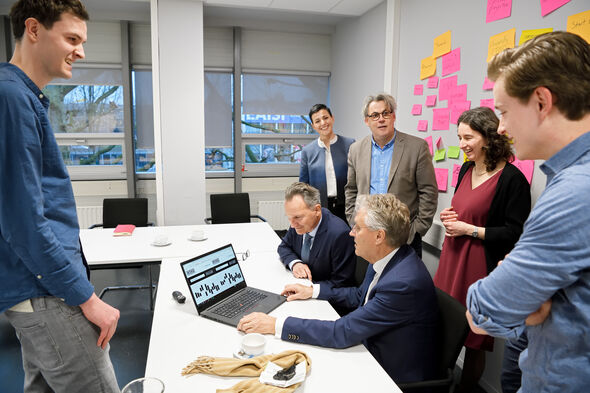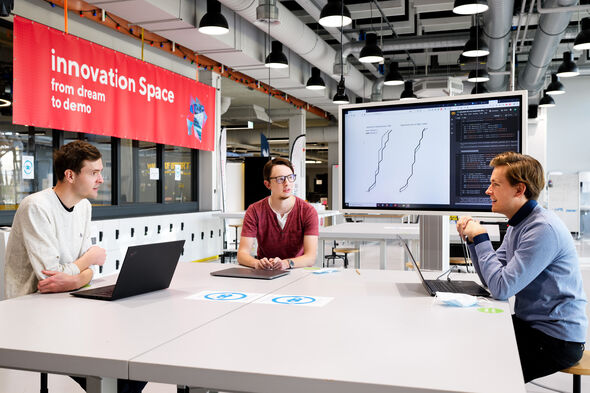Promising fingerprint earns unexpected attention
Eindhoven students who are themselves developing a technique to combat fraud during online exams; what a topsy-turvy world. The media found mileage in that. Two weeks ago this meant unexpected free advertising for the TU/e student team Intense Solutions. Fired with ambition and on the way to becoming a serious startup, they found themselves thrust into the spotlight thanks to their modest role in Dutch Design Week.
“It was a crazy week,” laughs Bob van der Meulen, who still has no real idea why their project in particular (one of many in the virtual Drivers of Change exhibition at this year's DDW) drew so much attention from journalists. One application could count on special attention: using the analysis of a person's - unique - typing behavior to combat fraud during online exams. The master's student of Innovation Management sees why this element sparked media interest, “but as a result the rest of our story got a little lost.”
That story starts with Kayle Knops, TU/e student of Electrical Engineering, whose hobby interest prompted him a couple of years ago to develop a pressure-sensitive keyboard. “That's fun, he thought, I can get a figure to run faster if I press the key down harder.”
The two students met during the annual TU/e Contest one year, tells Van der Meulen. He laughs, “I had a very bad idea; he had a very good idea. And he was looking for someone with more of a industrial management background to help him with his idea. We put our heads together: how can we take this further?”
One of the applications the students started to develop is using the keyboard as a possible device for detecting burn-outs. “You can read things from how someone types, such as whether they are stressed, angry or tired. Their typing style can say a lot about someone's well-being.” This concept earned the students, who have gone by a succession of names in recent years, multiple prizes and grants (including an MRE grant worth fifty thousand euros), and a spot in TU/e innovation Space.
Cute student team
Intense Solutions, as the team came to be called, currently has seven members and two applicants knocking on their door. The step from “simply a cute student team working with fun technology” (as Van der Meulen puts it) towards becoming a serious startup is one they hope to make this coming year. No longer will they be offering a piece of hardware in the form of the pressure-sensitive keyboard that Knops built. This startup's product will instead be an authentication application: “Pure software, which costs less to produce and upscale. If the software works here, it will also work in China or the United States.”
A privacy- and user-friendly technology for authenticating yourself; in short this is what Intense has to offer, says Van der Meulen. Their software will achieve this by analyzing a person's typing style. How short or long, hard or softly a person presses down a key, the time between different key strokes - “all that kind of thing makes your typing style unique. And it all depends, in turn, on say the size of your hands and whether you are left- or right-handed.” Together they form a digital fingerprint of sorts, says Van der Meulen sketching out the idea, “but one that is even more secure in fact than a real fingerprint. Why? Because you can't steal it or copy it - it is behavior.”
And this alternative fingerprint may prove interesting for, say, anyone who works with sensitive data. Think of hospitals where an endless stream of patient files have to be updated - not uncommonly amid the chaos of, say, an operating room where there isn't actually any time for complicated authentication procedures. Think of online banking environments, where for the customer wanting to log in admittance will only be gained after a two-step verification process. “Our technology saves people that second step because the way in which they type and thus, for example, enter their password or PIN code, is unique to them.”
Keystroke dynamics
Opportunities for this kind of technology, according to Van der Meulen, are plentiful. And in view of this, he says, various startups around the world are working on what is known as 'keystroke dynamics' “and they are making huge progress. They are securing rounds of investment worth millions of euros, are being sponsored by companies like Google.” He goes on to add, without false modesty, “But we think we are doing it better and have something unique to offer.”
What distinguishes Intense from the rest of the field, according to the student, is that the Eindhoven technology can authenticate a person's identity continuously. “The competition often looks at set pieces of text, for example whether you always type in your password in the same way. We go a step further and look at your typing and mouse behavior after you've done that.”
What's more, as Van der Meulen stresses, the Intense software registers only how someone types ’; not what he or she types. “We see, for example, not that someone types ‘hey’ but that this person has pressed three different keys, for how long and at what interval. This enables us to say with confidence that we are more privacy-safe than the competition.”
And yes, these characteristics do indeed make the software potentially interesting when online exams are being administered, as various media highlighted enthusiastically two weeks ago. After all, is the student who is sitting the exam really who they claim to be? Van der Meulen is keen to emphasize that the technology produced by Intense is intended primarily to support existing tools in this area; it is not a replacement. In any event, the much-discussed sensitivities relating to privacy aside, he does recognize the practical limitations of webcam surveillance. “Via the webcam you can't really see whether someone is looking at their keyboard or the cell phone lying next to it.”
The team, according to this student, is in discussion with various parties, including universities, universities of applied sciences, SURF (ICT partner in higher education) and various online testing platforms. “We have no agenda, we're open to possibilities. There's no one solution that we are really keen to work up. It is simply a search, a really cool search.”
Paying customer
The team hopes to have secured their first real customer before the end of the academic year. “You can spend forever fishing for grants and pitching to investors, but what you really need is someone who realizes that you are solving a problem for them and is prepared to pay for that. This also gives potential investors more faith. Once we have found our place in the market, the sky is the limit.”
For now, the students at Intense are very content with their spot in TU/e innovation Space, where they are benefitting gratefully from the experience of more established teams such as Solid, InMotion and CORE. “How do you create a good, close-knit team, what's our legal situation - much of what we are now running into, they have already dealt with.”
Besides, not having to reinvent every wheel is saving them some time, in a period when Intense is occupying an increasing number of their leisure hours. Alongside his dual master's (at TU/e and in Tilburg) Van der Meulen spends on average twelve to sixteen hours a week working with the team, “in busy weeks like now it sometimes gets up to thirty or forty hours.” Not that this has spelled immediate disaster for his studies. Take his last exams, for example, “but my grades are no longer eights and nines,” he admits laughing.
![[Translate to English:]](/fileadmin/_processed_/5/1/csm_BvOF_Intense_Solutions_1_e9cb93a8b4.jpg)



Discussion